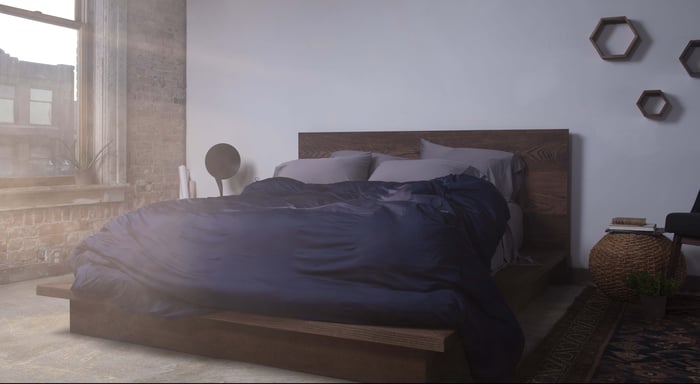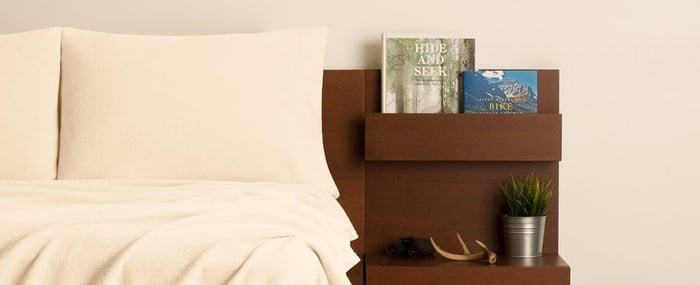Your alarm clock screams and snaps you out of a deep sleep. You’re annoyed at its intrusion and that makes you start to wonder how to wake up without an alarm clock.
Below are some ways to wake up, more naturally, without the alarm clock and start your day well-rested and ready to go. You’ll want to think about using your body’s biological clock, when you take a nap, how to motivate yourself to get going, your sleep environment and the influence of technology.
Using Your Body’s Natural Rhythm
Your body has its own set schedule called the circadian rhythm. This regulates your wake and sleep cycles by controlling when you fall asleep and triggering wakefulness the next day.
Paying attention to this is crucial to learning how to wake up without an alarm clock. Most adults need seven to nine hours of sleep. Once the body has met those requirements, the brain slowly wakes it up. Calculate what time you need to get up in the morning and adjust your bed time accordingly, but go slowly. Abruptly making it earlier could cause more disruption.
Affirm Your Desire to Wake Up Naturally
Using your subconscious is another way to tackle how to wake up without an alarm clock. Before you go to bed, remind yourself why you need to wake up the next morning. Say, "I need to wake up at 6 a.m. to go to the gym." Your mind wants a reason to wake up early and if you make it convincing, you will wake up naturally at the time you mention. Be sure to use a specific time and specific activity and repeat it to yourself as many times as you think you'll need for it to stick.
Limit Your Naps
Only take naps in the seven hours after you've woken up, no later. Napping after this window will disrupt your sleep cycle, keeping you asleep longer and unable to wake up naturally at an earlier time.
Setting Up Your Sleep Environment
As your body cycles through the different stages of sleep, it is very aware of its surroundings. This means changes in light will trigger the brain to wake up the rest of the body.
Ideally, you want to arrange your room in a manner that allows natural light to cross your eyelids, wake up your brain and help you wake up without an alarm. The light will activate your optic nerve and thus wake up the rest of your brain and body.
You should also make your sleep experience as restorative as possible using soft sheets and comfortable sleepwear. SHEEX® Performance Bedding will keep you cozy and relaxed while SHEEX® Performance Sleepwear, available for both men and women, will keep you cool and dry with its moisture-wicking, breathable fabric.
Give Yourself a Friendly Nudge
Along with telling yourself you need to get out of bed early, give yourself a compelling reason to get going with some outside help.
Buy a coffee maker with a timer that will brew a pot of coffee at your exact wake up time and force you to get out of bed to drink it while it's still hot.
Drink a huge glass of water right before bed so you'll have to get up and use the bathroom first thing upon waking.
Stop checking your emails at 6 p.m. the night before so you feel like you must get up and check them once you've opened your eyes the next morning.
If you need the boost to go to the gym before your workday starts, take a creatine tablet immediately when you wake; this will push you out of bed and to the gym because you'll need to exercise 30 minutes after taking it.
Limit Your Use of Technology
Your constant need to be plugged in may be impeding your ability to fall asleep and naturally move through the sleep cycle. Staring at the television or your brightly-lit cell phone screen, disrupts your eyes’ ability to adjust to the darkened room and ease into a relaxed state.
Blue light from technology also inhibits melatonin production, which helps your body sleep. Studies have shown that people who have no blue light interaction before bed slept 50 percent better than those that did.
Try instituting a rule of no technology an hour before bed time. Weaning yourself off your devices and slowly removing technology distractions will help you fall asleep more quickly thus leading to restful sleep. In time, your body will learn to wake up naturally without an alarm.
When you think about how to wake up without an alarm, remember to pay attention to your body's natural rhythm, limit your naps, motivate yourself with words and outside help, improve your sleep space and cut back on screen time.






